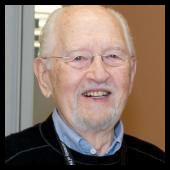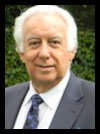In Memorium

Julius Younger
(1920-2017)
Distinguished Service Professor Emeritus, University of Pittsburgh
Julius S. Youngner, Sc.D., a world-renowned virologist best know for this contributions to the development of the first effective polio vaccine alongside Jonas Salk, died peacefully on April 27, 2017 at his home in Pittsburgh, surrounded by family. Dr. Youngner, a Distinguished Service Professor Emeritus of microbiology and medical genetics at the University of Pittsburgh School of Medicine, had a remarkable scientific career that spanned more than 60 years, influenced the careers of an entire generation of virologists, and has saved innumerable lives.
Dr. Youngner’s contributions to virology began shortly after his arrival at the University of Pittsburgh in 1949 as an Assistant Professor. At that time, Dr. Youngner started working with Dr. Jonas Salk on the development of a vaccine for poliomyelitis. A number of significant advances toward the realization of this vaccine, which came to be called the Salk vaccine, followed in a remarkably brief time. In particular, Dr. Youngner’s efforts were responsible for establishment of techniques for the production of poliovirus on a large scale, and he developed the process for the inactivation of the infectivity of the virus without destroying its activity as a vaccine. He also devised methodology for safety testing of vaccine batches, including those used in the first field trial. A simple color test for anti-polio antibodies, used to determine the efficacy of immunization in human subjects was also the fruit of Dr. Youngner’s efforts.
It was during the course of his work on the polio vaccine that Dr. Youngner exploited a new and effective technique for culturing cells from animal tissues. This involved the simple expedient of treating tissues with proteolytic enzymes to obtain cell suspensions used to establish primary cell cultures. This method, now commonly referred to as trypsinization is the basis for modern cell culture, and the publication describing this advance, has been cited so often that it has achieved the status of a so-called citation classic according to the criteria of the Informational Sciences Institute.
Since his initial early work on the polio vaccine and related topics, Dr. Youngner has continued to make major advances in the field of virology and immunology. In the area of interferon research, Dr. Youngner was the first to demonstrate that non-viral agents could trigger interferon induction in animals. In addition, Dr. Youngner and his colleague, Dr. Samuel Salvin, identified a second variety of interferon that was acid-sensitive and termed it Type II interferon, which is now known as gamma-interferon. Dr. Youngner also made several significant contributions to the understanding of the antiviral-effect of interferon and was the first to demonstrate the anti-interferon effect of some viruses, particularly poxviruses, a research area that is currently under active investigation in many laboratories.
Persistent viral infection has been another field in which Dr. Youngner has made a seminal contribution. Working with RNA viruses, his laboratory developed insights into the factors involved in the establishment and maintenance of persistent infections by virulent viruses in cell culture model systems. The role of selection and amplification of defective viral mutants in the evolution of persistence led to the understanding that many of these mutants were dominant-negative viruses that were able to interfere with the replication of their wildtype parental viruses.
Dr. Youngner’s productivity has continued to the present day. As an outgrowth of studies of dominant-negative mutants, Dr. Youngner has devised a novel approach to antiviral therapy. He and his colleagues have demonstrated that the live, attenuated virus vaccine for influenza A is a dominant mutant virus that is able to directly interfere with wild-type influenza virus in animals and protect them from disease. This characteristic is distinct from the ability of the live virus vaccine to induce a protective immune response. This strategy for influenza antiviral therapy may have the potential for a significant impact on the morbidity and mortality associated with influenza infections and may be applicable to other systems.
Most recently, Dr. Youngner and his colleague, Dr. Patricia Dowling developed a live, attenuated equine influenza vaccine that was licensed by the USDA on November 17, 1999. This patented vaccine was licensed to Heska Corporation of Ft. Collins, CO, who supported the development of the vaccine and is responsible for its production and distribution. The vaccine “FluAvert IN” is administered intranasally and is considered by equine veterinarians to be the first effective influenza vaccine to prevent a serious respiratory disease of horses.

Ray Spier
(1938-2018)
Dr. Ray Spier has been a leader in vaccines and the founder of ISV.
Having been educated at Christ Church, Oxford and University College, London in Biochemistry (First Class Honours), Chemical Microbiology and Biochemical Engineering he then spent 7 years as a Senior Process Engineer in industry. The last 3 years in America were spent with Merck Sharpe and Dohme where he was introduced to animal cell biotechnology and the production of viruses for use in veterinary and human vaccines. On returning to the UK he worked for 10 years at the Animal Virus Research Institute, Pirbright, scaling-up bioreactors for virus vaccine production processes and maximizing the biological productivity of the BHK cell lines for Foot-and-Mouth Disease virus generation. He then moved to the University of Surrey as Professor and was Head of Microbiology (7 years) and was then (1997) appointed to the first chair in the UK in ‘Science and Engineering Ethics’. His publication record includes over 200 research papers and reviews along with over 20 edited books and an encyclopedia on animal and plant cell culture technology. In 2002 his book, ‘Ethics Tools and the Engineer’, was published by CRC Press. He is currently the Vaccine Series Editor in Chief, and Editor in Chief of Vaccine Research Quarterly, Procedia in Vaccinology, Trials in Vaccinology and ‘Science and Engineering Ethics’. Having founded the European Society for Animal Cell Technology in 1975 and the International Society for Vaccines in 1996 (President: 2007-11), he was elected to be President of the European Association for Higher Education in Biotechnology in 2000.
